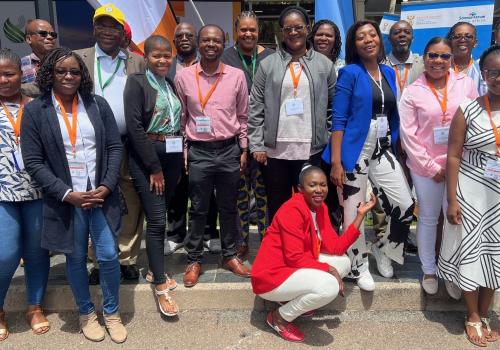The Southern African Development Community Secretariat (SADC), in partnership with the United Nations Educational, Scientific and Cultural Organisation Regional Office for Southern Africa (UNESCO-ROSA), the South African Department of Science and Innovation (DSI), the National Research Foundation-South African Agency for Science and Technology Advancement (NRF-SAASTA), Human Sciences Research Council (HSRC), Southern African Network of Water Centres of Excellence (SANWATCE), South African Science Journalists’ Association (SASJA), Stellenbosch University (SU) and Tshwane University of Technology (TUT) convened a two-day Science Journalism workshop training titled “Advancing Science Journalism and Science Communication Capacity in the SADC-region and Africa” at the Council for Scientific and Industrial Research (CSIR) Convention Centre in Pretoria, Republic of South Africa, on 4-5 December, 2023.
The training was held in a hybrid format and aimed to provide participants with an in-depth understanding of complex scientific issues facing Africa, sensitize participants to ethical dilemmas in science and science journalism, especially from a social justice perspective and provide guidance to participants working in environments where science and research outcomes need to be made accessible to the public and to science policy audiences.
Upon completion of the two-day workshop, participants are expected to have an in-depth understanding of selected scientific issues relevant to Southern Africa and Africa, an in-depth understanding of the significance of those issues and how to communicate about or report on them, have a thorough understanding of the ethical challenges related to complex scientific issues, have necessary tools to deal with disinformation and necessary skills to develop and pitch story ideas about these issues from a range of angles and perspectives (i.e., from an African perspective to local and global audiences), and the necessary skills and networking opportunity to develop proposals for the 2025 and future conferences of the World Federation of Science Journalists.
Ms. Mmampei Chaba, Chief Director, Multilateral Cooperation and Africa, Department of Science and Innovation (DSI), South Africa, in her opening remarks, informed participants that based on the success of the inaugural training held at the Stellenbosch University on 30th November to 2nd December 2022, the science capacity building workshop will be convened annually as part of the run-up to the Science Forum. She said the aim is to equip journalists with necessary skills to write their stories on issues in science and technology, climate change, and related fields.
Ms Chaba commended participants for attending the science journalism capacity building workshop and encouraged them to participate in the World Federation of Science Journalists annual conference in 2025 which will be hosted for the first time in Africa by South Africa.
Ms. Anneline Morgan, Senior Programme Officer responsible for Science, Technology and Innovation at SADC Secretariat underlined that the workshop is being convened in response to the decisions of the SADC Joint Ministerial meeting on Education and Training and Science, Technology and Innovation where the Ministers directed the Secretariat and Partners to build the capacity of journalists and media in science communication to advance the importance of science and innovation development.
She encouraged journalists to enter the annual SADC Media Awards competition in the four categories namely, Photo, Print, Television and Radio Journalism. The SADC Media Awards were established in 1996 to recognise best media work in disseminating information on SADC to support the process of regional cooperation and integration. The first prize winner in each of the four categories mention above receives US$2,500 and the runner-up receives US$1000. The SADC Media Awards are open to only journalists from the SADC Member States.
Ms. Mandi Smallhorne, President of the South African Science Journalism Association (SASJA), and Vice-President of the World Federation of Science Journalists (WFSJ) explained that the SADC region and other African countries are grappling with the effects of climate crises such as tropical storms and floods like, Cyclone Freddy (2023), Cyclone Idai (2019) and the Durban floods (2022). She implored journalists to expand coverage of climate change stories and report on how changes in global climate systems have an impact on environmental, health and social issues on a local and regional level.
The training workshop attracted both experienced and young journalist from within South Africa and across the SADC region.

